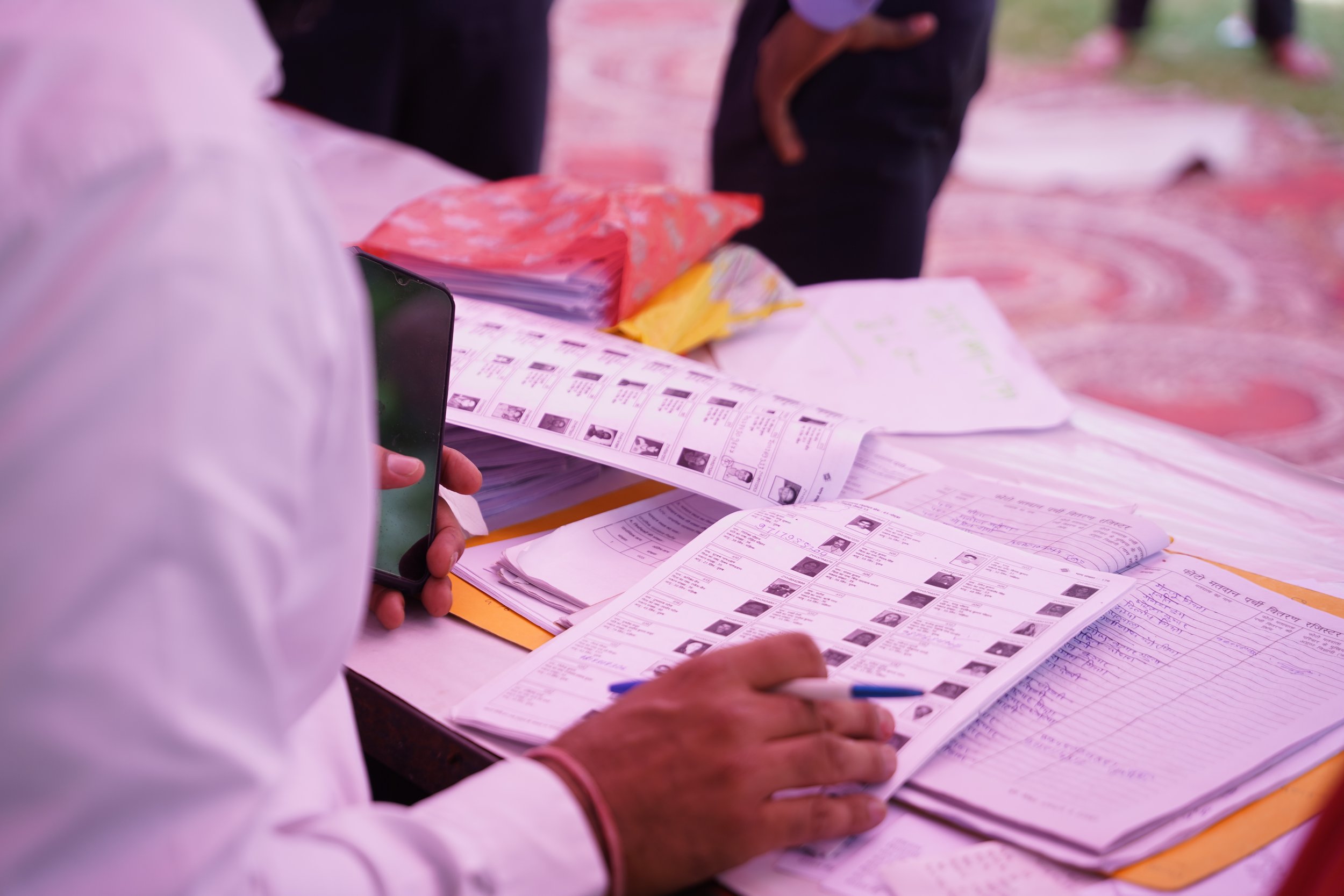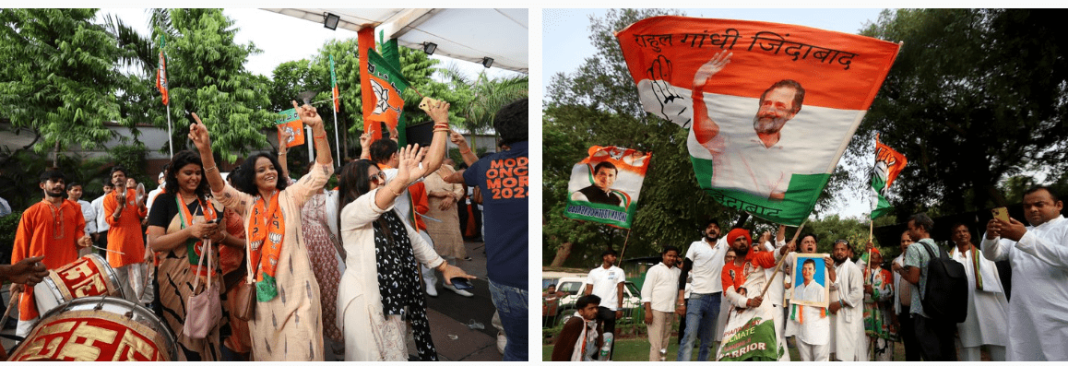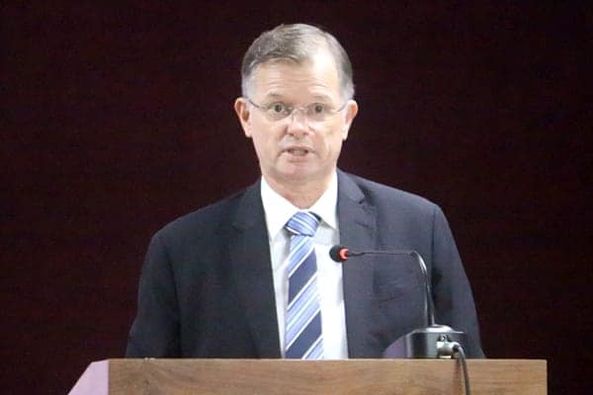As Prime Minister Narendra Modi and BJP reel from a shaky but rare third victory, analysts explain how polling agencies missed the mark in the world’s largest democracy.
Pallavi Pundir and Riyaz Wani | June 6, 2024
On Tuesday morning, just as vote counting for India’s General Elections began, a video of a man crying on a prime-time news show went viral.
Pradeep Gupta, the chairman and managing director of a poll survey company called Axis My India, had predicted a landslide victory for Prime Minister Narendra Modi’s Bharatiya Janata Party (BJP), with a vote share of almost 400 seats out of total 543 in the Parliament.
The result, however, was wildly different.
Although BJP has been declared victorious for a rare third consecutive time, it fell short of the 272 seats that are needed to form the government, thereby relying on allied parties to constitute the majority.
Poll predictions aren’t a definitive indicator of election outcomes. Nevertheless, Axis My India’s survey had been splashed all over mainstream media channels and social media before and during elections, which took over a month.
Modi’s comeback, according to Gupta, was not just imminent but also signalled his strongman persona and the enduring cult of the BJP. Coinciding with the exit polls arrived Modi’s own post on X, formerly known as Twitter: “I can say with confidence that the people of India have voted in record numbers to re-elect the [BJP alliance] NDA government.”
But the results on Tuesday were a far cry from the dominant stronghold that BJP had established in the last two elections. This stumble also constituted a symbolic victory for INDIA (Indian National Developmental Inclusive Alliance), a multi-party alliance formed in 2023 led by India’s largest opposition party, the Indian National Congress.
INDIA was formed directly in opposition to NDA, but was predicted to lose by a huge margin. However, they won 234 seats, putting up a legitimate fight against NDA’s 272. For comparison, in the last general elections in 2019, NDA won 353 seats while the Congress-led alliance won only 91. This rearrangement marks a monumental shift for the political sentiments in India, which had been overwhelmingly supportive of BJP, at least in vote shares.
On June 4, as vote numbers started to form a clear picture, Gupta was grilled by news anchors on how predictions went so wrong. He started weeping, prompting journalist-anchor Rajdeep Sardesai to comment, “All pollsters need to introspect…that [poll predictions are] terrible.”
In the theatre of the world’s largest electoral process this year, Axis My India was among a flurry of opinion polls that predicted Modi’s landslide victory. But in the world’s most populated country – with over 640 million voters this year – exit polls are tricky, and their purpose can lean toward self-fulfilment.
“Some goals of [exit polls] may be flattery, but there can also be attempts to create or strengthen a narrative,” said Joyojeet Pal, a professor at the School of Information at the University of Michigan. “For instance, by repeatedly stressing that one party is likely to win in a big way, the coalition partners of the likely winner may be moved to be more acquiescent to the wishes of the broader coalition.”
Indian journalist and researcher Pamela Philipose called it a money-making system: “Pollsters are often supported by political parties, especially the ruling party, who stand to benefit from their projections even if it is only for a short time. It creates a narrative which helps in government formation.”
“Media channels mint money through advertising for such programmes,” she added, referring to how exit polls have historically boosted Television Rating Point (TRP) of English and Hindi news channels. “And then there’s the stock market.”
This week saw India’s stock market’s worst tumble in four years after BJP lost its parliamentary majority. India’s stocks recorded losses on both June 4 and June 5, driving investors to react negatively to the election results. On June 6, opposition leader Rahul Gandhi accused the BJP’s top leaders, including Modi, of misleading people into buying stocks before elections, which led to the market crash.
Before the results, another opposition leader Sitaram Yechury had told Indian news channel NDTV that exit polls were done to influence share markets.
“The way the stock markets behaved,” Philipose added, “shows how this system fuels financial speculation.”
****
In the lead up to the 2024 elections, the BJP had the ambitious slogan, “Ab ki baar, 400 paar”, or “This time, we’ll cross 400 (seats).” As per the final count, BJP won 240 seats, down from 303 seats it won in 2019.
This discrepancy left most of the country shocked with the results.
All the biggest private survey agencies such as Today’s Chanakya, Matrize and C-Voter, got it wrong. An aggregate of 14 such exit polls predicted that the NDA would win 365 Lok Sabha seats, an increase from the 352 seats it secured in 2019. INDIA was predicted to receive just 146 seats. This, when there was no visible wave in favour of any party or politician, including Modi.
The most astonishing were the results in Uttar Pradesh, India’s most populous state which sends 80 members to the Parliament, and had been BJP’s flagship supporter in the last two elections. This is where Modi’s Ram Mandir project, which was built in Ayodhya city on a site contested by the Muslim minority, galvanised millions of Hindu supporters worldwide.
Exit polls had predicted that the BJP would secure between 64-68 seats in the state on the back of, among other aspects, the Ram Temple popularity. Instead, it secured only 36. INDIA, on the other hand, secured 43. The BJP, ironically, also lost in the Faizabad constituency, which includes Ayodhya city, to INDIA.


Voting takes place at a poll station in Noida, Uttar Pradesh, on April 26, 2024. Photo Credit: Vijay Sadasivuni
The pattern continued in West Bengal, where the BJP was predicted to win between 20-30 seats, but ended up with just 12, and Maharashtra, where the NDA secured 17 seats out of 48.
Praveen Dhonti, an analyst at International Crisis Group, says one of the biggest reasons why the exit polls missed the clear shift of voting preferences away from the BJP was fear.
“There is a fear [among the people] towards the Modi government, the BJP and its supporters,” said Dhonti. “The masses kept the cards close to their chest. They didn’t open up to most of the media or the agencies conducting these exit poll surveys.”
Pal, the professor, echoed this sentiment, calling it a “spiral of silence”, in which “people may be slightly afraid to admit to not voting for the BJP since it is very well organised on the ground.”
Polling agencies have confirmation bias too, Dhonti added. “They didn’t see or explore beyond what they thought would be a sure win for Modi,” he said.
This isn’t the first time exit polls failed their own predictions. In 2004, the favourably placed Atal Bihari Vajpayee-led NDA government failed to secure a second term despite running a high-decibel campaign.
Experts are now questioning whether the tradition of exit polls should continue after all.
For one, exit polls operate opaquely, says Pal. “[They] are not clear about their sampling, enumeration process, and framing of questions – all of which may have biassing impacts,” he said. “It has been suggested that over-sampling of urban, middle class populations may have caused systematic failure in accurately capturing the mood.”
“The opacity is likely intentional in part because a lot of the agencies which run these are not empirically trained to do these,” Pal added.
The polls may have exaggerated but Modi will be sworn in as Prime Minister for his third consecutive term on Sunday, June 9, at 6 pm IST. BJP’s alliance parties are expected to demand key positions in return for their support.
The political impact of this week’s turn of events are yet to be seen, but the failure of exit polls in predicting national sentiment will not be forgotten anytime soon.
“Exit polls are a bit of a mystery to me,” said Michael Kugelman, the director of South Asia Institute at The Wilson Center. “If they’re meant to bolster the ruling party, then why would they put themselves out there and risk looking silly later on, as was the case with just about every exit pollster this time?”
Asian Dispatch is a cross-border journalism initiative focusing on public interest journalism. Our series, Asian Dispatch Explainer, is meant to be an informative guide for major events in Asia.
This story was originally published on 6 June 2024 on Asian Dispatch.net




